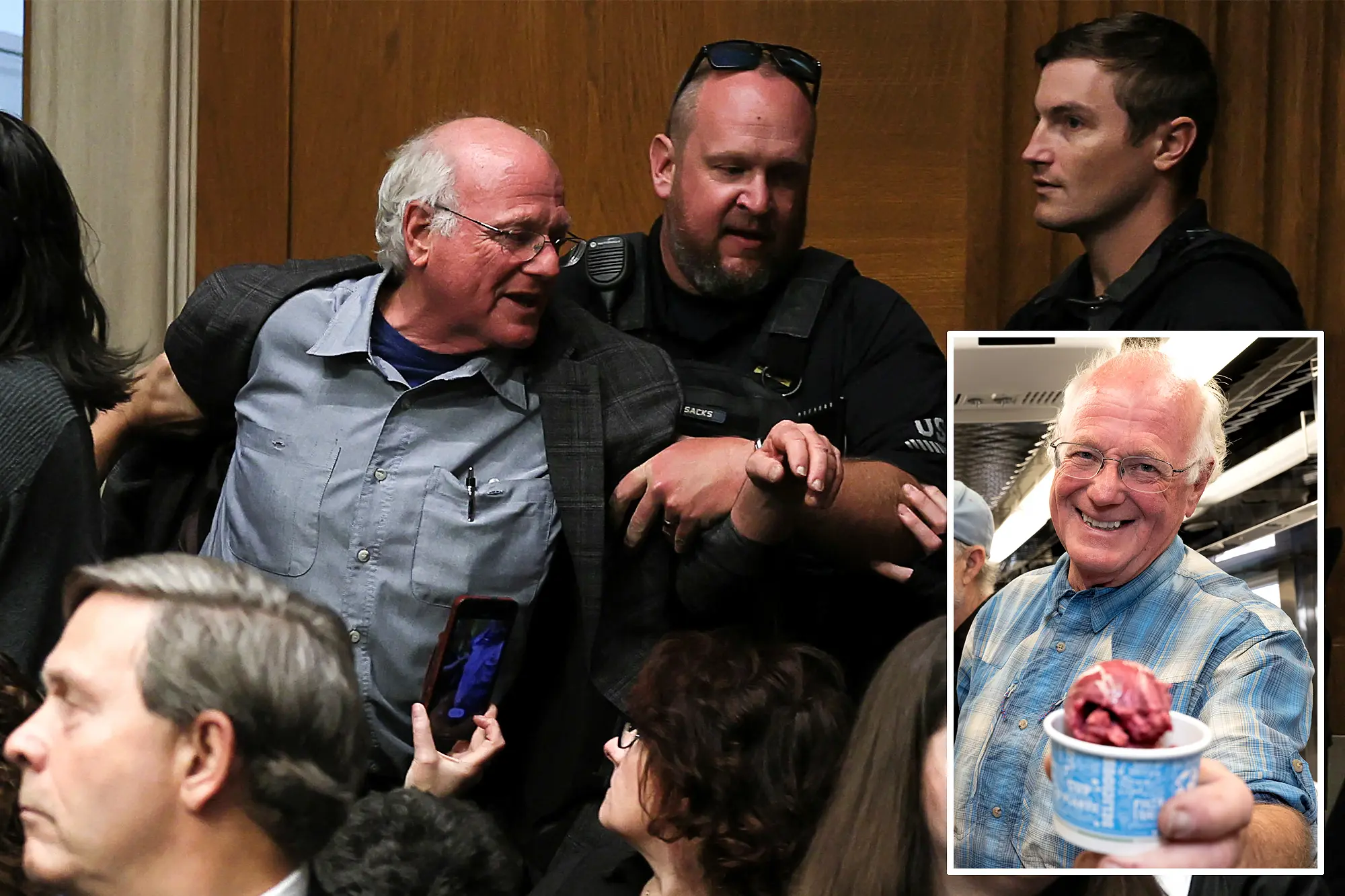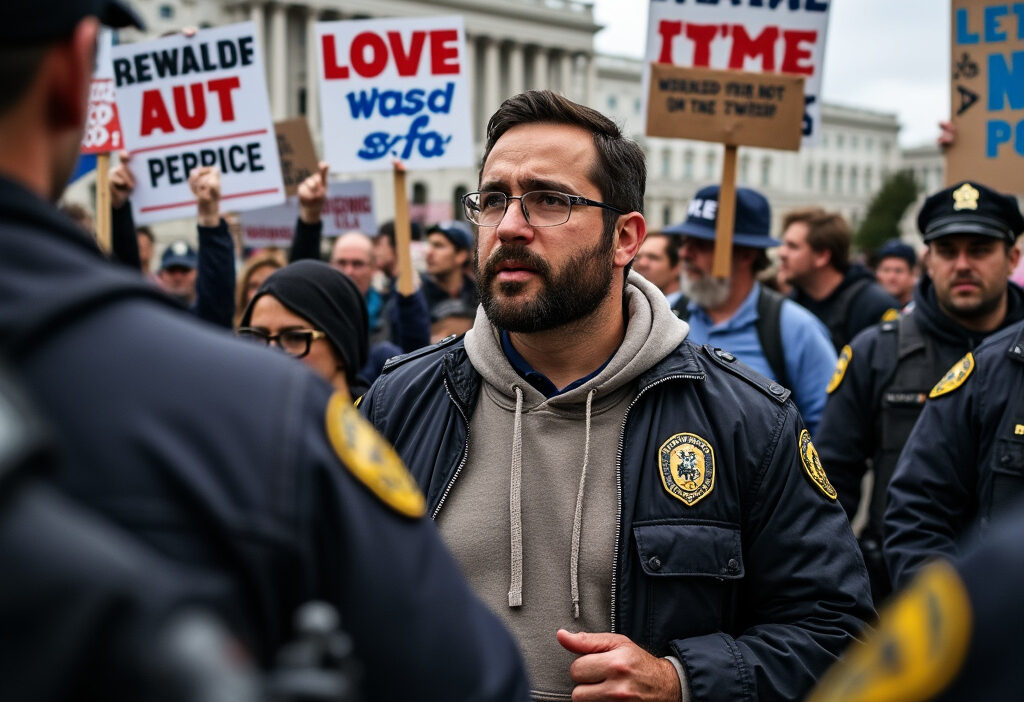Activism in Action: The Arrest of Ben & Jerry’s Co-Founder
In May 2025, Ben Cohen, co-founder of the iconic ice cream brand Ben & Jerry’s, was arrested during a protest at a Senate hearing. This event spotlighted the intersection of activism, business leadership, and international politics, sparking discussions on U.S. military aid to Israel and the crisis in Gaza. This article delves into the details and implications of Cohen’s protest.
The Arrest Heard Around the World
On June 4, 2024, Ben Cohen, co-founder of Ben & Jerry’s, was arrested during a Senate hearing at the Kennedy Caucus Room in Washington, D.C. The hearing, convened to discuss U.S. military aid to Israel, became a flashpoint when Cohen and other activists disrupted proceedings with chants and signs condemning the humanitarian crisis in Gaza. As senators debated increased funding, Cohen stood and unfurled a banner reading “Stop Arming Genocide”, prompting Capitol Police to intervene.
Witnesses described a tense scene as officers forcibly removed Cohen after he refused to stop speaking. His arrest, captured on live streams and news cameras, spread rapidly, igniting debates on free speech and U.S. foreign policy. Major outlets like The Washington Post and CNN highlighted the clash, while social media amplified footage of Cohen being escorted out in handcuffs.
Public reactions split sharply. Pro-Palestinian groups praised his boldness, calling it a necessary escalation, while critics dismissed it as grandstanding. The arrest underscored the growing divide over U.S. military aid, setting the stage for deeper scrutiny of the policies fueling Gaza’s devastation—a theme explored further in the next chapter.
Behind the Protest
Behind the Protest: The arrest of Ben Cohen at Senator Kennedy’s hearing was not an isolated act but a calculated demonstration against U.S. military aid to Israel and its devastating consequences in Gaza. Cohen and fellow activists disrupted the proceedings with chants like “Stop arming genocide” and “No more money for war crimes,” while holding signs displaying images of Palestinian children with messages such as “U.S. dollars = Palestinian graves.” Cohen, in his statement before being detained, emphasized the moral hypocrisy of funding what he called “indiscriminate violence” while ignoring the humanitarian crisis in Gaza, where over 15,000 children have been killed or injured in recent conflicts.
The protest targeted the $3.8 billion in annual U.S. military assistance to Israel, a policy critics argue enables systemic violence against Palestinians. Cohen’s group highlighted how this aid fuels airstrikes and blockades that deprive Gaza of food, water, and medical supplies. The demonstration sought to force lawmakers to confront the human cost of unconditional support, framing military aid as complicity in what international organizations label potential war crimes. The activists’ disruption was a direct challenge to Washington’s unwavering alliance with Israel, demanding accountability for policies they argue perpetuate suffering.
The Capitol’s Response
The Capitol’s response to Ben Cohen’s protest during the Senate hearing was swift and methodical. As Cohen and fellow activists disrupted proceedings with chants condemning U.S. military aid to Israel, the committee chair immediately called for order, instructing Capitol Police to intervene. Officers moved in, their approach measured but firm, reflecting protocol for handling disruptions in congressional hearings. The protesters, however, refused to disperse voluntarily, linking arms and continuing their slogans until physically escorted out.
Eyewitnesses described a tense but nonviolent exchange, with Cohen emphasizing the moral urgency of their cause even as officers guided him away. Capitol Police avoided excessive force, but their actions underscored the institutional intolerance for unsanctioned dissent within the halls of power. The committee later resumed the hearing with little acknowledgment of the interruption, though the spectacle had already reverberated through media channels.
Behind the scenes, Senate staffers debated the optics of the arrest, weighing free speech against the need for decorum. The incident highlighted the growing friction between activist tactics and legislative procedure, setting the stage for the legal and social fallout that would follow. The Capitol’s reaction, while predictable, amplified the protesters’ message far beyond the hearing room.
Legal and Social Aftermath
Ben Cohen and his fellow protesters faced charges of unlawful disruption of Congress, a misdemeanor carrying potential fines and up to six months in jail. Legal experts noted the charges were typical for Capitol protests but underscored the symbolic weight of prosecuting a high-profile activist like Cohen. His arrest amplified scrutiny of the legal system’s handling of dissent, particularly around politically charged issues like U.S. military aid to Israel.
Cohen was released shortly after processing, with supporters hailing his actions as a moral stand against Gaza’s humanitarian crisis. In post-arrest interviews, he framed the protest as a necessary escalation, stating, “Silence is complicity when children are starving.” His remarks resonated with progressive circles, sparking debates about corporate responsibility and free speech. Social media reactions were polarized: while some praised his courage, others accused him of undermining diplomatic efforts.
The broader social response reflected deepening divisions over Israel-Palestine, with activist groups leveraging Cohen’s arrest to mobilize further demonstrations. Meanwhile, critics questioned whether celebrity involvement diluted the focus on policy. The legal aftermath remained unresolved, but the incident undeniably intensified public discourse on military aid and corporate activism.
A Legacy of Activism
Ben & Jerry’s has long been synonymous with progressive activism, a legacy deeply rooted in the values of its founders, Ben Cohen and Jerry Greenfield. From its inception in 1978, the company distinguished itself not just through its ice cream but through its commitment to social justice, environmental sustainability, and corporate responsibility. Cohen and Greenfield embedded activism into the brand’s DNA, championing causes like climate change, racial equity, and fair trade—often ahead of mainstream corporate trends. Their decision to stop selling ice cream in occupied Palestinian territories in 2021 was a bold political statement, aligning with their history of taking controversial stands.
Cohen’s arrest at Senator Kennedy’s hearing was not an isolated act but a continuation of decades of public advocacy. In the 1980s, he campaigned against nuclear proliferation, while in the 2000s, he vocally opposed Citizens United and corporate money in politics. Unlike traditional CEOs, Cohen and Greenfield have never shied away from leveraging their platform for activism, even at the risk of alienating customers or investors. This latest protest against U.S. military aid to Israel fits squarely within their pattern of using personal and corporate influence to challenge systemic injustice, reinforcing the idea that Ben & Jerry’s is as much a vehicle for change as it is a business.
The Crisis in Gaza
The humanitarian crisis in Gaza had reached catastrophic levels by the time of Ben Cohen’s protest. A 16-year blockade, enforced by Israel and Egypt with U.S. support, had crippled Gaza’s infrastructure, leaving 95% of its water undrinkable and 80% of the population dependent on aid, according to UNRWA reports. The blockade, justified as a security measure against Hamas, had instead deepened poverty, with unemployment exceeding 45% and food insecurity affecting 64% of households (World Food Programme, 2023).
The 2023 escalation of violence worsened conditions, with Israeli airstrikes destroying hospitals, schools, and residential areas. The UN documented over 200 Palestinian deaths in the months preceding the protest, including 47 children. Medical supplies were depleted, and power cuts—lasting up to 20 hours daily—paralyzed critical care. Amnesty International accused Israel of “collective punishment,” a violation of international law, while the U.S. continued military aid, fueling the conflict.
Cohen’s arrest at the Senate hearing underscored the urgency of addressing Gaza’s suffering, framed by a broader debate over U.S. complicity. The protest targeted not just policy but the moral contradictions of funding a humanitarian disaster—an issue the Senate HELP Committee would confront head-on in subsequent discussions.
Senate Dynamics and Debate
The Senate HELP Committee hearing, where Robert F. Kennedy Jr. testified about government transparency and public health, became an unexpected stage for activism when Ben & Jerry’s co-founder Ben Cohen was arrested. The hearing, ostensibly focused on budgetary allocations, quickly turned into a microcosm of broader political tensions—particularly around U.S. military aid to Israel. Kennedy’s testimony, which critiqued corporate influence in policy, inadvertently set the tone for Cohen’s protest. By disrupting the proceedings, Cohen highlighted the dissonance between domestic policy debates and the humanitarian crisis in Gaza, where U.S. funding plays a direct role.
The timing of the protest was deliberate. As senators debated budget priorities, Cohen’s arrest underscored how military aid—often treated as a line item—has tangible, devastating consequences. The HELP Committee, typically associated with healthcare and labor issues, became a symbolic battleground for questioning the morality of unchecked defense spending. Kennedy’s presence amplified this, as his criticisms of institutional failures mirrored activists’ demands for accountability in foreign policy. The protest didn’t just challenge the committee’s agenda; it forced a collision between domestic legislative processes and international humanitarian concerns, exposing the Senate’s compartmentalized approach to crises.
Cohen’s arrest, while brief, punctuated the hearing with a stark reminder: policy decisions in Washington reverberate far beyond its chambers. The disruption was a calculated escalation, bridging the gap between grassroots activism and high-stakes political theater.
Public Perception and Media Coverage
The arrest of Ben & Jerry’s co-founder Ben Cohen during Robert F. Kennedy Jr.’s Senate HELP Committee hearing sparked a media storm, with coverage varying sharply across outlets. Mainstream media like CNN and Fox News framed the incident differently—CNN emphasized Cohen’s activism as part of a broader protest against U.S. military aid to Israel, while Fox focused on the disruption of Senate proceedings, painting it as disrespectful. Progressive outlets like The Intercept and Democracy Now! highlighted the moral urgency of Cohen’s stand, tying it to Gaza’s humanitarian crisis.
Social media amplified the divide. Pro-Palestinian activists circulated clips of Cohen’s arrest with hashtags like #CeasefireNow, while conservative accounts mocked his tactics. Cohen leveraged the moment, posting a statement on X (formerly Twitter) that framed his arrest as a necessary escalation: “When dialogue fails, disruption becomes a moral duty.” The viral nature of the incident forced even neutral platforms to cover it, though often without contextual depth.
Public opinion polls revealed a generational split—younger respondents overwhelmingly supported Cohen’s actions as bold advocacy, while older demographics viewed them as inappropriate. The media’s polarized framing underscored how activism is increasingly judged not by its message but by the lens through which it’s reported.
Future Implications for Activist Movements
The arrest of Ben Cohen at Senator Kennedy’s hearing could set a precedent for how corporate figures engage in activism, blurring the lines between business leadership and direct political action. By risking legal consequences, Cohen demonstrated that corporate social responsibility (CSR) isn’t just about statements or donations—it can involve tangible, disruptive advocacy. This raises critical questions:
- Will more executives follow suit, leveraging their influence for high-stakes protests, or will fear of backlash deter them?
- Could this shift the expectations around CSR, pushing companies beyond performative allyship into riskier, more confrontational activism?
- How might corporations navigate the tension between shareholder interests and the moral imperatives of their leaders?
Cohen’s arrest also highlights the growing intersection of corporate power and grassroots movements. While his status amplified the message, it also invited scrutiny—critics may dismiss such actions as PR stunts, while supporters see them as necessary escalation. The fallout could inspire similar acts, particularly on polarized issues like Gaza, but it may also force a reckoning: Can corporate activism sustain its credibility if it avoids real sacrifice? Future movements will likely scrutinize this balance, testing whether symbolic gestures or arrests like Cohen’s yield lasting change.
Reflections on Corporate Activism
Ben Cohen’s arrest at Senator Kennedy’s hearing underscores the evolving role of corporate leaders in activism, challenging the traditional boundaries between business and social justice. His bold stance against U.S. military aid to Israel, despite personal and professional risks, reflects a growing trend where executives leverage their influence to address humanitarian crises. Unlike conventional corporate social responsibility (CSR), which often focuses on safe, non-controversial causes, Cohen’s actions exemplify direct engagement with contentious political issues—a shift from symbolic gestures to tangible dissent.
This incident invites comparison to other business leaders who’ve taken public stands, such as Patagonia’s Yvon Chouinard suing the Trump administration over public lands or Salesforce’s Marc Benioff opposing discriminatory LGBTQ+ laws. However, Cohen’s arrest distinguishes itself by embracing civil disobedience, a tactic rarely seen among corporate elites. While Chouinard and Benioff worked within legal frameworks, Cohen’s protest mirrors grassroots movements, blurring the line between CEO and activist.
The significance lies in its potential to redefine corporate activism. By risking arrest, Cohen signals that some issues demand more than statements or donations—they require disruption. Whether this inspires others depends on how the public and business world reconcile the tension between profit and principle. His actions remind us that corporate power, when aligned with moral conviction, can transcend boardrooms and enter the streets.

Conclusions
Ben Cohen’s arrest underscores the powerful role that individual activism can play in highlighting global injustices. This incident not only sheds light on the humanitarian crisis in Gaza but also prompts a reevaluation of the efficacy and ethics of U.S. foreign aid. It challenges us to consider the responsibilities of business leaders in advocating for social justice, setting a precedent for future activism.



